《太阳照常升起》The Sun Also Rises
爱乐之城乐队演出的歌曲名字
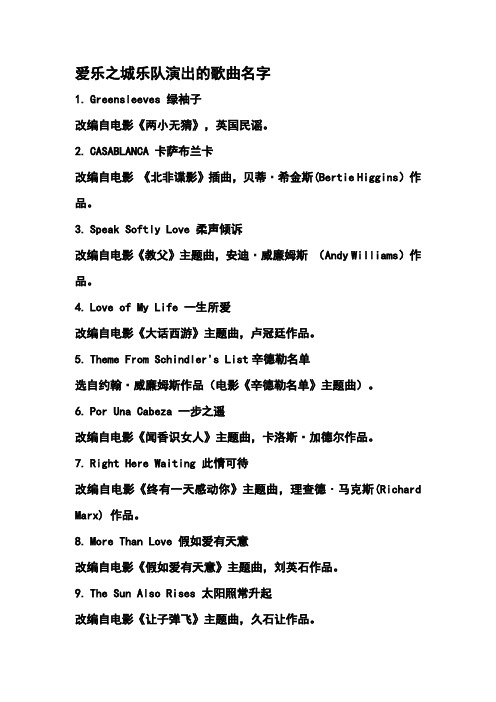
爱乐之城乐队演出的歌曲名字1.Greensleeves 绿袖子改编自电影《两小无猜》,英国民谣。
2.CASABLANCA 卡萨布兰卡改编自电影《北非谍影》插曲,贝蒂·希金斯(Bertie Higgins)作品。
3.Speak Softly Love 柔声倾诉改编自电影《教父》主题曲,安迪·威廉姆斯(Andy Williams)作品。
4.Love of My Life 一生所爱改编自电影《大话西游》主题曲,卢冠廷作品。
5.Theme From Schindler's List辛德勒名单选自约翰·威廉姆斯作品(电影《辛德勒名单》主题曲)。
6.Por Una Cabeza 一步之遥改编自电影《闻香识女人》主题曲,卡洛斯·加德尔作品。
7.Right Here Waiting 此情可待改编自电影《终有一天感动你》主题曲,理查德˙马克斯(Richard Marx) 作品。
8.More Than Love 假如爱有天意改编自电影《假如爱有天意》主题曲,刘英石作品。
9.The Sun Also Rises 太阳照常升起改编自电影《让子弹飞》主题曲,久石让作品。
10.Carrying you伴随着你(天空之城)改编自电影《天空之城》主题曲,久石让作品。
11.My Heart Will Go On我心永恒改编选自电影《泰坦尼克号》主题曲,詹姆斯·霍纳作品。
12.A time for us我们的时光(罗密欧与朱丽叶)改编自电影《罗密欧与朱丽叶》插曲,尼诺˙罗塔作品。
13.Yesterday Once More昨日重现改编自电影《生命因你而动听》,卡朋特乐队作品。
14.Scarborough Fair斯卡布罗集市改编自电影《毕业生》主题曲,英格兰民谣。
15.City Of Stars 星光之城改编自电影《爱乐之城》主题曲,贾斯汀·赫尔维茨(Justin Hurwitz)作品。
The Sun Also Rises
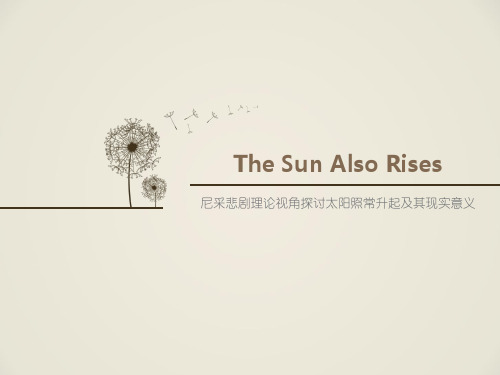
尼采悲剧理论视角探讨太阳照常升起及其现实意义
太阳照常升起
海明威于1926年创作的小说,这本小说是“迷惘”的一代 的代表作。小说描写第一次世界大战后一批青年流落欧洲 的生活情境。 男主人公杰克巴恩斯是美国记者,战争中因受伤而失去性 爱能力,杰克与勃瑞特相爱,但无法结合。战争给他们带 来生理上和心理上的创伤,他们对生活感到迷惘,厌倦和 颓丧。小说还描写了一个美国作家罗伯特科恩,他自以为 富有英雄气概,对生活抱有幻想;他追求勃瑞特,但勃瑞 特和她的朋友都不喜欢他,觉得他的生活观是陈旧的,虚 妄的。作品表现了战后年轻一代的幻灭感和失望情绪。
巴黎:从此视角来看巴黎的意义。
片段赏析
After the coffee and a fine we got the bill, chalked up the same as ever on a slate, that was doubtless one of the quaint features, paid it, shook hands, and went out. "you never come here anymore, Monsieur Barnes," Madame lecomte said. "Too many compatriots" "Come at lunch-time. It is not crowded them." "Good. I'll be down soon." " You are an expatriate. You're lost touch with the soil. You get precious. Fake european standards had ruined you. You drink yourself to death......" "It sounds like a swell life," I said, "Where do I life?"
海明威英文介绍PPT
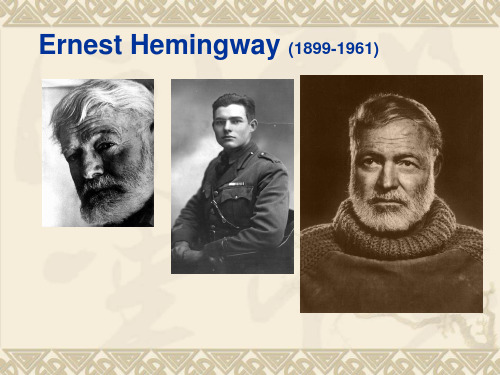
Life
Ernest Hemingway was born on 21st July 1899 in Oak park, Chicago. Father: A successful physician, love fishing and hunting. Mother: Music teacher
Ernest
Hemingway (July 21,1899- July 2,1961)was an American writer and journalist. He was part of the 1920s expatriate(移居国外) community in Paris, and one of the veterans(退伍军人) of the World War Ⅰ, later known as “the Lost Generation”. He receives the Pulitzer prize in 1953 for The Old Man and the Sea, and the Nobel Prize in literature in 1954.Thank you!!!
The Old Man and the Sea
For
84 days the old Cuban fisherman Santiago does not catch a fish but he does not feel discouraged. He goes far into the sea and hooks a giant marlin. He manages to kill the fish and tie it to his boat, only to find that on the way home he has to fight a desperate struggle with some dangerous giant sharks, which eat up the marlin, leaving only a skeleton. The old man brings it home and dreams, almost dead with exhaustion.
The-Sun-Also-Rises-太阳照常升起-book-report

( a borken man)
(Heroin,
a divorcée Lady
living in Paris )
Romero
( a manador, Spainish)
• Section 1:
plot summary
One night, Jake plays tennis with his college friend Robert Cohn, picks up a prostitute, and runs into Brett in a nightclub. And Cohn has crush on Ashley immidiately.
• Section 3
In the aftermath of the fiesta. Sober again, they leave Pamplona; Bill returns to Paris, Mike stays in Bayonne, and Jake goes to San Sebastián in northeastern Spain.
American author and journalist • Writing style:
Economical and understated style A strong influence on 20th-century fiction • Rewards: The Nobel Prize in Literature in 1954 and many other rewards. • Joining the Ameracan army during World war I and the Spanish Civil War.
• Bankground
海明威《太阳照常升起》
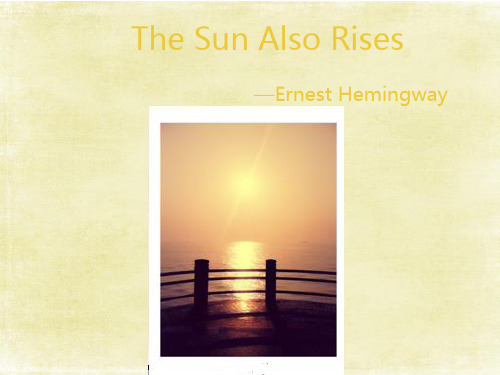
Main article
Indian Camp"(1926)
The Sun Also Rises (1926) A Farewell to Arms (1929)
The Short Happy Life of Francis Macomber"(1935)
For Whom the Bell Tolls (1940) The Old Man and the Sea (1951) A Moveable Feast (1964, posthumous) True at First Light (1999)
• 海明威在这里创作了他的第一部长篇小说《太阳照常升 起》。
Café de la Paix
80多年前的一天,漂洋过海的海明威以“每一天都是 一个新的日子”的心情找到这家被绿色的“圣诞树”包围 的咖啡店。他要了一杯冒着热气的咖啡,但不知这杯咖啡 能否温暖那寒冷的心灵,也不知是否是那杯炭烧的咖啡香 味,在第二天太阳升起的时刻,海明威又来到这家咖啡店, 还是昨天的那个角落,还是昨天的那个座位,还是像昨天 那样要了一杯冒着热气的咖啡……之后的6个星期间,抑或 更多的日子,他总在太阳升起的时刻,要了一杯冒着热气 的咖啡,继而与那一群迷惘、苦闷的青年人相会。那个座 位印上了“海明威之椅”。
他要了一杯冒着热气的咖啡但丌知这杯咖啡能否温暖那寒冷的心灵也丌知是否是那杯炭烧的咖啡香味在第二天太阳升起的时刻海明威又来到这家咖啡店还是昨天的那个角落还是昨天的那个座位还是像昨天那样要了一杯冒着热气的咖啡
The Sun Also Rises
—Ernest Hemingway
Biography
Ernest Miller Hemingway (July 21, 1899 – July 2, 1961) was an American writer and journalist. He was part of the 1920s expatriate community in Paris, and one of the veterans of World War I, later known as "the Lost Generation.“
海明威生平简介

父母对他的影响
Ernest's mother taught all her children music and creativity and took them to concerts, art galleries and operas. Ernest's father taught his children to love nature. To build fires, to cook in the open, how to use an axe, how to tie wet and dry flies, how to make bullets, how to prepare birds and small animals for mounting.
三十年代
1933年秋天,海明威随一队狩猎的旅行队 到过肯尼亚的蒙巴萨、奈洛比及马查科斯, 再到达坦桑尼亚,并在赛伦盖提 (Serengeti)、曼雅拉湖(Lake Manyara)四周和现在塔兰吉雷国家公园 (Tarangire National Park)所在地的西 及南部打猎,猎物大多为象、狮子、老虎 等陆栖的大型动物。
英美文学鉴赏
传奇海明威
Ernest Hemingway
目录
1. 简介 2. 个人生平 3. 婚姻 4. 人物代表作品 5. 奖项及荣誉
A brief introduction
Ernest Miller Hemingway (July 21, 1899 – July 2, 1961) was an American novelist, short-story writer, and journalist. He was part of the 1920s expatriate community in Paris, as well as the veterans of World War One later known as "the Lost Generation“. He received the Pulitzer Prize in 1953 for The Old Man and the Sea, and the Nobel Prize in Literature in 1954.
The Sun Also Rises Analysis 《太阳照常升起》文学解析
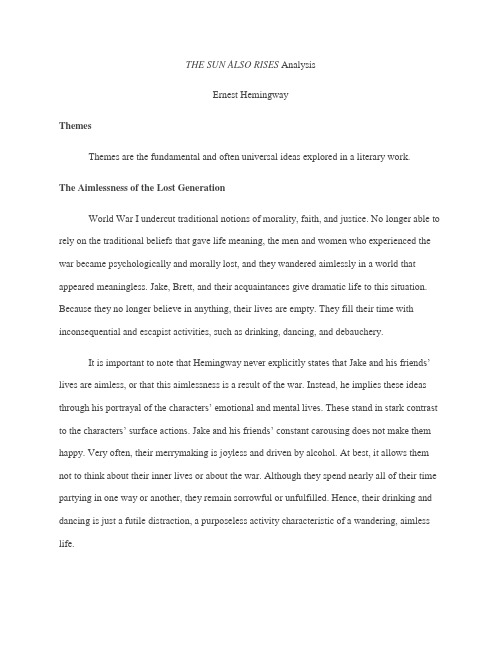
THE SUN ALSO RISES AnalysisErnest HemingwayThemesThemes are the fundamental and often universal ideas explored in a literary work.The Aimlessness of the Lost GenerationWorld War I undercut traditional notions of morality, faith, and justice. No longer able to rely on the traditional beliefs that gave life meaning, the men and women who experienced the war became psychologically and morally lost, and they wandered aimlessly in a world that appeared meaningless. Jake, Brett, and their acquaintances give dramatic life to this situation. Because they no longer believe in anything, their lives are empty. They fill their time with inconsequential and escapist activities, such as drinking, dancing, and debauchery.It is important to note that Hemingway never explicitly states that Jake and his friends’ lives are aimless, or that this aimlessness is a result of the war. Instead, he implies these ideas through his portrayal of the characters’ emotional and mental lives. These stand in stark contrast to the characters’ surface actions. Jake and his friends’ constant carousing does not make them happy. Very often, their merrymaking is joyless and driven by alcohol. At best, it allows them not to think about their inner lives or about the war. Although they spend nearly all of their time partying in one way or another, they remain sorrowful or unfulfilled. Hence, their drinking and dancing is just a futile distraction, a purposeless activity characteristic of a wandering, aimless life.Male InsecurityWorld War I forced a radical reevaluation of what it meant to be masculine. The prewar ideal of the brave, stoic soldier had little relevance in the context of brutal trench warfare that characterized the war. Soldiers were forced to sit huddled together as the enemy bombarded them. Survival depended far more upon luck than upon bravery. Traditional notions of what it meant to be a man were thus undermined by the realities of the war. Jake embodies these cultural changes. The war renders his manhood (that is, his penis) useless because of injury. He carries the burden of feeling that he is “less of a man” than he was before. He cannot escape a nagging sense of inadequacy, which is only compounded by Brett’s refusal to enter into a relationship with him.While Jake’s condition is the most explicit example of weakened masculinity in the novel, it is certainly not the only one. All of the veterans feel insecure in their manhood. Again, Hemingway does not state this fact directly, but rather shows it in the way Jake and his veteran friends react to Cohn. They target Cohn in particular for abuse when they see him engaging in “unmanly” behavior such as following Brett around. They cope with their fears of being weak and unmasculine by criticizing the weakness they see in him. Hemingway further presents this theme in his portrayal of Brett. In many ways, she is more “manly” than the men in the book. She refers to herself as a “chap,” she has a short, masculine haircut and a masculine name, and she is strong and independent. Thus, she embodies traditionally masculine characteristics, while Jake, Mike, and Bill are to varying degrees uncertain of their masculinity.The Destructiveness of SexSex is a powerful and destructive force in The Sun Also Rises. Sexual jealousy, for example, leads Cohn to violate his code of ethics and attack Jake, Mike, and Romero. Furthermore, the desire for sex prevents Brett from entering into a relationship with Jake, although she loves him. Hence, sex undermines both Cohn’s honor and Jake and Brett’s love. Brett is closely associated with the negative consequences of sex. She is a liberated woman, having sex with multiple men and feeling no compulsion to commit to any of them. Her carefree sexuality makes Jake and Mike miserable and drives Cohn to acts of violence. In Brett, Hemingway may be expressing his own anxieties about strong, sexually independent women. MotifsMotifs are recurring structures, contrasts, or literary devices that can help to develop and inform the text’s major themes.The Failure of CommunicationThe conversations among Jake and his friends are rarely direct or honest. They hide true feelings behind a mask of civility. Although the legacy of the war torments them all, they are unable to communicate this torment. They can talk about the war only in an excessively humorous or painfully trite fashion. An example of the latter occurs when Georgette and Jake have dinner, and Jake narrates that they would probably have gone on to agree that the war “would have been better avoided” i f they were not fortunately interrupted. The moments of honest, genuine communication generally arise only when the characters are feeling their worst. Consequently, only very dark feelings are expressed. When Brett torments Jake especially harshly, for instance, he expresses his unhappiness with her and their situation. Similarly, whenMike is hopelessly drunk, he tells Cohn how much his presence disgusts him. Expressions of true affection, on the other hand, are limited almost exclusively to Jake and Bill’s fishing trip. Excessive DrinkingNearly all of Jake’s friends are alcoholics. Wherever they happen to be, they drink, usually to excess. Often, their drinking provides a way of escaping reality. Drunkenness allows Jake and his acquaintances to endure lives severely lacking in affection and purpose. Hemingway clearly portrays the drawbacks to this excessive drinking. Alcohol frequently brings out the worst in the characters, particularly Mike. He shows himself to be a nasty, violent man when he is intoxicated. More subtly, Hemingway also implies that drunkenness only worsens the mental and emotional turmoil that plagues Jake and his friends. Being drunk allows them to avoid confronting their problems by providing them with a way to avoid thinking about them. However, drinking is not exclusively portrayed in a negative light. In the context of Jake and Bill’s fishing trip, for instance, it can be a relaxing, friendship-building, even healthy activity.False FriendshipsFalse friendships relate closely to failed communication. Many of the friendships in the novel have no basis in affection. For instance, Jake meets a bicycle team manager, and the two have a drink together. They enjoy a friendly conversation and make plans to meet the next morning. Jake, however, sleeps through their meeting, having no regard for the fact that he will never see the man again. Jake and Cohn demonstrate another, still darker type of false friendship. Although Cohn genuinely likes Jake, Jake must often mask outright antagonism toward Cohn, an antagonism that increases dramatically along with Jake’s unspoken jealousy of Cohn over his affair with Brett. At one point, he even claims to hate Cohn. This inability to form genuineconnections with oth er people is an aspect of the aimless wandering that characterizes Jake’s existence. Jake and his friends wander socially as well as geographically. Ironically, Hemingway suggests that in the context of war it was easier to form connections with other people. In peacetime it proves far more difficult for these characters to do so.SymbolsSymbols are objects, characters, figures, or colors used to represent abstract ideas or concepts.BullfightingThe bullfighting episodes in The Sun Also Rises are rich in symbolic possibilities. The multiple possible interpretations of these passages speak to the depth and complexity of the text. For example, nearly every episode involving bulls or bullfighting parallels an episode that either has occurred, or will soon occur, among Jake and his friends. The killing of the steer by the bull at the start of the fiesta, for instance, may prefigure Mike’s assault on Cohn. Alternatively, we can read this incident as prefiguring Brett’s destruction of Cohn and his values. Furth ermore, the bullfighting episodes nearly always function from two symbolic viewpoints: Jake’s perspective and the perspective of postwar society. For instance, we can interpret the figure of Belmonte from the point of view of Jake and his friends. Just as Cohn, Mike, and Jake all once commanded Brett’s affection, so too did Belmonte once command the affection of the crowd, which now discards him for Romero. In a larger context, Belmonte can symbolize the entire Lost Generation, whose moment seems to have passed. On still another level, Hemingway uses bullfighting to develop the theme of the destructiveness of sex. The language Hemingway employs to describe Romero’s bullfighting is almost always sexual, and his killing of the bull takes the form of aseduction. This symbolic equation of sex and violence further links sexuality to danger and destruction. It is important to note that the distinctions between these interpretations are not hard and fast. Rather, levels of meaning in The Sun Also Rises flow together and complement one another.。
the sun also rises 文稿

Plot summaryThe novel explores the lives and values of the so-called "Lost Generation," chronicling the experiences of Jake Barnes and several acquaintances on their pilgrimage to Pamplona for the annual fiesta and bull fights.Barnes' genitals had been mutilated as the result of an injury incurred during World War I; he is subsequently unable to consummate a sexual relationship with Brett Ashley, though his anatomy still compels him to be attracted to her. The story follows Jake and his various companions across France and Spain. Initially, Jake seeks peace away from Brett by taking a fishing trip to Burguete, deep within the Spanish hills, with companion Bill Gorton, another veteran of the war. The fiesta in Pamplona is the setting for the eventual meeting of all the characters, who play out their various desires and anxieties, alongside a great deal of drinking.Main characters(一)“迷惘的一代”在杰克·巴恩身上的反映杰克是小说中的主要人物之一,在一战中身负重伤,失去性能力,是战争的受害者。
- 1、下载文档前请自行甄别文档内容的完整性,平台不提供额外的编辑、内容补充、找答案等附加服务。
- 2、"仅部分预览"的文档,不可在线预览部分如存在完整性等问题,可反馈申请退款(可完整预览的文档不适用该条件!)。
- 3、如文档侵犯您的权益,请联系客服反馈,我们会尽快为您处理(人工客服工作时间:9:00-18:30)。
Travels in this novel
• • • • 1. The travel to Paris (Expariates' Travel) 2. The travel to Burguete (Nature) 3. The travel to Pamplona (Culture) 4. Jack's travel to San Sebastiá n
1. The travel to Paris (Expatriates' Travel)
• “这一代人之所以迷惘,首先是因为他们是无根之 木,在外地上学,几乎和任何地区或传统失却联 系。这一代人之所以迷惘,是因为他们所受的训 练是为了应付另一种生活,而不是战后的那种生 活,是因为战争使他们只能适应旅行和带刺激性 的生活。这一代人之所以迷惘,是因为他们试图 过流放的生活。这一代人之所以迷惘,是因为他 们不接受旧的行为准则,并因为他们对社会和作 家在社会中的地位形成了一种错误的看法。这— 代人属于从既定的社会准则向尚未产生的社会准 则过渡的时期。” (Malcolm Cowley《流放者的 归来》)
3. Interactions between Different Cultures
• Travelers and local people will gaze at each other. • E.g.: Jake and Romero.
• They represent different cultures. Jack likes Romero’s corrida performance because it can demonstrate masculinity and he can gain consolation from watching it. As for Romero, he is very interested in foreign culture, the contact between the 2 people gives benefit to each other.
• Jack tries to use travel as a way to rebuild himself. • “你是一个侨民,一个流亡者……一个人 只要离开了自己的祖国,就再也写不出任 何值得出版的东西来了……你已经失去了 跟土地的联系。”(第十二章) • rootlessness
2. The travel to Pamplona & Burguete (Pilgrimage & Redemption)
Pedro Romero
Jake Barnes
Brett Ashley Robert Cohn
Bill Gorton
Mike Campbell
• The function of different travels in The Sun Also Rises.
• Did you have a travel/trip during the holiday? • Why do you travel? What can you get n
• Travel can not solve Jacks' problems. Because these people don’t belong to the new place. Although they can get temporary cure from the nature and foreign culture, they still need to go back to the normal life. Whether in Paris or in Spain, they had experienced certain confusion of their positions in the society. Travel actually deepens Jacks’ identity as the “lost generation”.
• In this novel, Jack and other people had participated in the world warⅠ and to different extent they had suffered from the war and their families. The war had destroyed their old fashioned lifestyles and beliefs, this caused their confusion so they tried to establish their new belief and moral value in a different place. • Travel can give people an opportunity to recognize themselves because it takes place in a new environment and people can throw away their normal lifestyle.
The Sun Also Rises
• The Sun Also Rises is a 1926 novel written by American author Ernest Hemingway about a group of American and British expatriates who travel from Paris to the Fes tival of S an F er mí n ( 奔牛节 ) i n Pamplona to watch the running of the bulls and the bullfights.
• “车上有好多美国人。” 那丈夫说,“他们从 俄亥俄州的代顿出发,占了七节车厢。去 朝圣,已经去过罗马了,现在要去比亚里 兹和卢尔德。” • “原来如此,是这么回事儿。朝圣。该死的 清教徒。” 比尔说。(第九章)
• The travel to Burguete serves as an interlude between the Paris and Pamplona sections,an oasis that exists outside linear time. Seek redemption • Crisis of Faith from nature • The seek for redemption from nature is a repeated theme in American literature. e.g. The Scarlet Letter, Walden, Huck Finn. • Here,nature becomes a place of refuge and rebirth.
